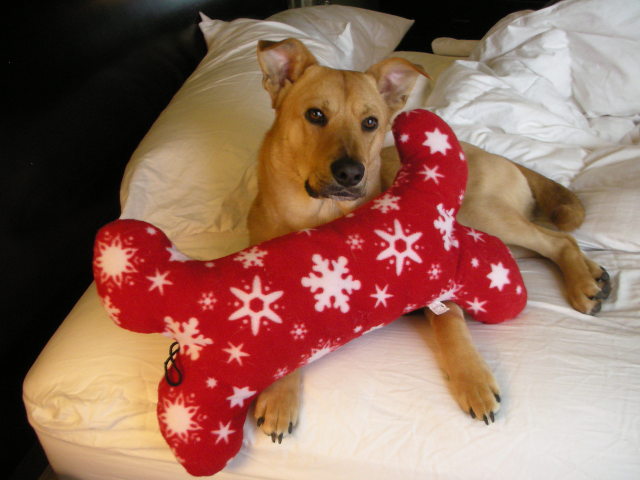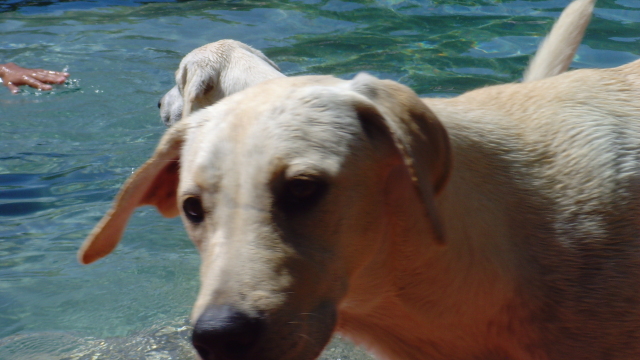QuestionHi,
In the past few months my dog (Rottweiler/Kelpie, 2yrs old)has become extremely scared of a lot of things. About 6 months ago we moved houses, in the previous house the fence was set far back from the street and the dog could see under it if he chose to lie down to check out anything else coming past. In the new house however the fence is set directly on the street, it is a moderately busy road, with people/other dogs/cars coming and going at all times of the day, as well as a bus service coming at 30 min intervals.
When we first moved he spent a few days being scared but then seemed to adjust, however when we walked him we noticed he would get nervous being tied up outside shops to wait... gradually things got worse from there. We figured maybe the more we walked him he might get over his fears however it just seems to make him worse. He is scared of the loud noises going past the fence - so he barks a lot, he is scared of things on the street such as rubbish bins, parked cars.. He has also now started to be scared of things that cause a shadow and even the sun! he barks at the sun (for some reason he has associated it with his fear) and when he is in the back yard by himself he only sits in the shade.
This has made it extremely hard to walk him, as he pulls so much on his lead trying to run away from whatever scares him its so hard to feel safe that he wont hurt himself/someone else. We have two parks around us, and he will walk to them fine, and run around off his lead without noticing any of the things he usually does, even happily greeting other dogs, he will get scared on the way to the park however as he is so familiar with the paths we take he doesnt seem to stay scared for long. We are too worried to change his routine as if scares him so much, however it may help? We cannot get him to the shops as we get about a block away and he seems to remember where we are walking and get scared before we even get there! Its also hard not to comfort him, especially when something scares him so much he literally shakes.
I have spoken to a few vets, he has had his eyes checked and he has perfect sight, they suggested that he has an anxiety disorder and advised medication, but it is EXTREMELY expensive and I don't like the idea of medicating him every day. I was wanting to know if there are and behavioral things i can do to help him, maybe some more training or an aversion therapy of some sort.. he has had obedience training and other than being scared he's a perfect dog.
I was also thinking an 'in home visit from a behavourist may help but i'm not sure if i can afford their prices as its about $150 per ONE visit.
if you could help me out with some ways to help him without medication, thanks!!
AnswerYour dog appears to have acquired a complex fear behavior along with some superstitious attributes (the sun). The dog absolutely needs medication along with professional behavior modification. Taking him to crowded places that obviously frighten him (and especially leaving him TIED in those places while you're in a store) is the wrong approach and should be avoided. Part of the responsibility of pet ownership is being able to accommodate sudden financial burdens. If a dog gets suddenly sick, a vet visit can cost hundreds (or more); this IS a sickness, but it's behavioral and at this point his fight/flight mechanism is geared to such a high level that behavior modification most likely won't work without medication. There are NO holistic products that can affect his fear. Propanalol (the generic for Inderal) is a beta blocker and is not expensive; this drug can at least truncate some of the adrenaline involved in the dog's automatic fight/flight response. According to the site I gave you below, "The basic objective of beta-adrenergic blockade is to decrease adverse sympathetic stimulation but not to the degree that impairs necessary sympathetic support":
http://www.mentalhealth.com/drug/p30-i02.html
I used this drug many times (in cooperation with my veterinary associate); it's quick acting (within hours of dose) with no harmful side effects to a healthy dog and can be abruptly stopped. You can print this site or most important aspects of it, and take it to the veterinarian. Ask your pharmacist about the cost.
I can offer you reading material but your dog has really got a serious case here and should actually see a behaviorist. Sometimes, given an owner's inability to pay full price, I have reduced my fee for the sake of the dog; I don't see why any other professional wouldn't accommodate you in this manner, you should be able to find one. The only site I have for behaviorists (which is international) is found below, but I have no idea of the education or professional credentials of its members, you'll have to check this yourself:
http://www.iaabc.org/
The reading material may be of some small assistance:
"Help for Your Fearful Dog..." by Nicole Wilde.
When you take this dog into a place where the very thing he fears is constant and in great numbers, you are flooding him; this is seriously aggravating his fear. In order to assist a dog to overcome objects of fear, he needs to be desensitized in careful increments. Your dog's fear, as I said, is over the top at this point; not only has he been flooded, but he's been tied (the worst thing is to give a dog no way of dealing with fear in a normal fashion), and you have comforted him (validating his emotional state and rewarding it). I don't know what you think "aversion therapy" is, but I'll tell you: it's a very good way to create an even more fearful dog. The dog is now responding to an autonomic nervous system response, not in his control; to add a punisher is out of the question.
Taking routine and 'safe' routes to a place where the dog is highly rewarded (the park) is the best approach without the help of a professional. Reward (verbally and with food) his CALM reactions. Learn to read his distress signals by reading Turid Rugaas' "On Talking Terms with Dogs". If the dog appears stressed, walk him in a circle left, then right, then ask for a "sit" and heavily reward that (food reward), then proceed forward again. This ONLY in areas where he is basically comfortable, you most likely won't be able to get a calm reaction in heavily trafficked streets, don't try. Repeated exposure to 'safe' places, with redirection for stress (from reading body language) and reward, can slowly give both you and the dog a venue to venture outdoors together. There's not much you can do about the busy activity on the other side of your fence, but you can attempt to 'work' him in obedience (with high reward, cheese or hot dog) every day for a few minutes to attempt to help him to change his reaction; I can't see from here if this even has a chance of working without medication, but it's worth a try.

 Very Scared Dog
Question
Happy
My dog is 17 months old and is a mixed b
Very Scared Dog
Question
Happy
My dog is 17 months old and is a mixed b
 agressive silky terrier
Question
Lucas 1 year old
Hi Jennifer:
I have a
agressive silky terrier
Question
Lucas 1 year old
Hi Jennifer:
I have a
 Nightmares?
Question
Beethoven
Hi Melissa, Ive had my very h
Nightmares?
Question
Beethoven
Hi Melissa, Ive had my very h
 Psychological trauma
Question
Izzy
I recently took my 1 year old dog to a fr
Psychological trauma
Question
Izzy
I recently took my 1 year old dog to a fr
 Post bladder surgery potty training for INDOORS!
QuestionTiki
QUESTION: Dear Dr. Connor,
My 10 ye
Post bladder surgery potty training for INDOORS!
QuestionTiki
QUESTION: Dear Dr. Connor,
My 10 ye